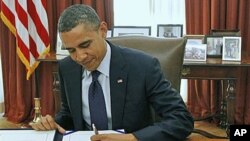After a tense impasse on Capitol Hill, lawmakers in the Senate and House of Representatives passed legislation to extend a payroll tax cut for two months and continue unemployment insurance for nearly 2 million jobless Americans. The renewal comes just before the benefits were set to expire.
The political standoff came to an end Friday as Congress approved the measure, first in the Senate and then in the House of Representatives.
With many members already out of town for the holidays, the chambers approved the legislation in brief morning sessions. In the Republican-led House, the bill passed by unanimous consent. Speaker John Boehner presided over the meeting.
“Without objection, the bill is engrossed, read for a third time and passed, and the motion to reconsider is laid on the table,” said Boehner.
It was a quiet ending to a bitter political battle. For six days, Boehner and his fellow House Republicans had refused to approve Senate legislation that extended the payroll tax cut for two months. Boehner demanded that the Senate come back to work and negotiate a one-year extension.
But Senate Republicans, the White House and voters, angered at the prospect of a tax increase starting January 1, put unrelenting pressure on the House Republicans.
Late Thursday, they backed down, and agreed to the shorter extension. Boehner said his party fought hard and there were some technical changes to the Senate bill that they approved.
Democratic Senate Majority Leader Harry Reid said negotiators from both chambers will work on a full-year extension after lawmakers return to Washington in January.
But Reid said he hopes Congress, especially the newer members, had a “very good learning experience” about how work gets done - by consensus. Democrats had blamed Tea Party House Republicans for holding up the bill.
“People wonder why the approval rating of Congress is so low. I don’t wonder. It seems that everything we’ve done this last year has been a knockdown, drag out fight. There is no reason to do that,” said Reid.
House Democratic Representative Steny Hoyer hailed the agreement as a win for the country.
“This is a good day for the American people. The American people’s voice was heard. Their concerns were heard and we have responded,” said Hoyer.
President Barack Obama, who signed the bill into law Friday, said after the House action that more work needs to be done on taxes and efforts to improve the economy and reduce unemployment. He also said that Americans who called, e-mailed and used social media to push for the tax bill's passage had made a difference.
Had the bill not been passed, about 2 million Americans would have lost their unemployment insurance payments, and 160 million Americans would have seen their tax bills rise by an average of $1,000. The bill also stops a reduction in payments for doctors who treat patients under the Medicare government health program for the elderly.
Congress Passes Payroll Tax Cut to End Political Standoff




